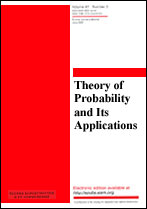|
|
Teoriya Veroyatnostei i ee Primeneniya, 1965, Volume 10, Issue 3, Pages 409–436
(Mi tvp538)
|
|
|
 |
This article is cited in 57 scientific papers (total in 57 papers)
Some limit theorems of the queueing theory. II. (Many channels systems)
A. A. Borovkov
Institute of Mathematics, Siberian Branch of USSR Academy of Sciences
Abstract:
Queneing systems with many input and output channels are considered. By the channel with index $j$, $1\le j\le m$, $m\ge1$, groups of calls of the random size $\eta_1^{(j)},\eta_2^{(j)},\dots$ arrive at the instants $a^{(j)}$, $a^{(j)}+\tau^{(j)}$, $a^{(j)}+\tau_1^{(j)}+\tau_2^{(j)},\dots$. The arrived calls fall in the general queue. The service is made by $M-m\ge1$ servers and described in the similar way: the server with index $j$, $m+1\le j\le M$, begins to work at the instant $a^{(j)}$ and can serve $-\eta^{(j)}\ge0$ calls during random time $\tau^{(j)}$. The sequences $\tau_1^{(j)},\tau_2^{(j)},\dots$; $\eta_1^{(j)},\eta_2^{(j)},\dots$; $j=\overline{1,M}$ “managing” the system are mutually independent sequences of independent identically distributed random variables.
Every server can work in one of the two ways: either the service starts at instans $a^{(j)}$, $a^{(j)}+\tau^{(j)}$, $a^{(j)}+\tau_1^{(j)}+\tau_2^{(j)},\dots$ regardless of the presence of the queue or the service begins only when there is at least one call.
In this paper all the limit distribution laws of the length of the queue $\theta(T)$ at instant $T\to\infty$ are found for the described systems working in heavy traffic when
$$
\delta=-\sum_{j=1}^M\frac{\mathbf M\eta^{(j)}}{\mathbf M\tau^{(j)}}\to0.
$$
Theorem. Let
$$
\sigma^2(\delta)=\sum_{j=1}^M\biggl[\frac{\mathbf D\eta^{(j)}}{\mathbf M\tau}+\frac{(\mathbf M\eta^{(j)})^2\mathbf D\tau^{(j)}}{(\mathbf M\tau^{(j)})^3}\biggr]\to\sigma^2>0\text{ as }\delta\to0
$$
and let for some $\gamma>0$ the moments $\mathbf M\tau^{(j)}$, $\mathbf M\bigl|\frac{\tau^{(j)}-\mathbf M\tau^{(j)}}{\sqrt{\mathbf D\tau^{(j)}}}\bigr|^{2+\gamma}$, $\frac{\mathbf M|\eta^{(j)}-\mathbf\eta^{(j)}|^{2+\gamma}}{\mathbf D\eta^{(j)}}$ be bounded uniformly in $\delta$. Let further the initial conditions $\theta(0)$, $a^{(1)},\dots,a^{(M)}$ satisfy the following requirements
$$
(\delta T)^{-1}\max_j\biggl(\theta(0),\frac{a^{(j)}}{\mathbf M\tau^{(j)}}\biggr)\underset{\mathbf P}\to0\text{ if }\delta\sqrt T\ge1
$$
and
$$
T^{1/2}\max_j\biggl(\theta(0),\frac{a^{(j)}}{\mathbf M\tau^{(j)}}\biggr)\underset{\mathbf P}\to0\text{ if }\delta\sqrt T<1
$$
A. If $\delta\sqrt T\to U$, $-\infty\le U\le\infty$
\begin{gather*}
\lim_{\delta\to0}\mathbf P\biggl(\theta(T)<\frac x{|\delta|}\mid\theta(0),a^{(1)},\dots,a^{(M)}\biggr)=
\\
=\mathbf P\biggl(\omega(t)<\frac{x+t\operatorname{sign}\delta}\sigma,\ 0\le t\le U^2\biggr).
\end{gather*}
B. If $\delta\sqrt T\to0$
$$
\lim_{\delta\to0}\mathbf P(\theta(T)<x\sqrt T\mid\theta(0),a^{(1)},\dots,a^{(M)})=\sqrt{\frac2\pi}\int_0^{x/\sigma}e^{-t^2/2}\,dt.
$$
C. If $\delta\sqrt T\to-\infty$
$$
\lim_{\delta\to0}\mathbf P(\theta(T)<-\delta T+x\sqrt T\mid\theta(0),a^{(1)},\dots,a^{(M)})=\frac1{\sqrt2\pi}\int_{-\infty}^{x/\sigma}e^{-t^2/2}\,dt.
$$
Here $\omega(t)$ is the standard Brownian motion process.
The similar assertion holds true for the waiting time.
Received: 24.12.1964
Citation:
A. A. Borovkov, “Some limit theorems of the queueing theory. II. (Many channels systems)”, Teor. Veroyatnost. i Primenen., 10:3 (1965), 409–436; Theory Probab. Appl., 10:3 (1965), 375–400
Linking options:
https://www.mathnet.ru/eng/tvp538 https://www.mathnet.ru/eng/tvp/v10/i3/p409
|


| Statistics & downloads: |
| Abstract page: | 456 | | Full-text PDF : | 156 |
|




 Contact us:
Contact us: Terms of Use
Terms of Use
 Registration to the website
Registration to the website Logotypes
Logotypes







 Citation in format
Citation in format 
